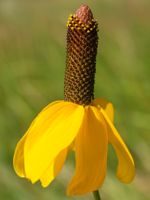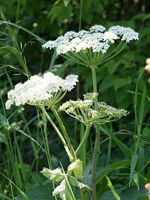Mon-Fri 9am - 5pm Mountain time
Upright Prairie Coneflower vs Cow Parsnip
Ratibida columnifera
Heracleum maximum
NOT AVAILABLE THIS SEASON - MIGHT RETURN
CUSTOM GROW
Upright Prairie Coneflower is a native perennial wildflower known for its vibrant flowers, which range from golden yellow to dark rust-red with yellow edges. Rising on tall, slender stems, the flowers’ drooping petals surround a central cone. They bloom from midsummer into fall, attracting butterflies, bees, and other pollinators. After blooming, the florets on the cone eventually develop into seeds, which provide a food source for birds.
Its upright growth habit allows it to grow in clusters, creating a striking display. Due to its deep taproot, Upright Prairie Coneflower is drought tolerant, making it well suited to dry areas and xeriscape gardens. Low-maintenance and deer-resistant, this wildflower is a great choice for adding vibrant color and ecological value to any landscape.
Cow Parsnip is a native perennial wildflower known for its tall growth, very large leaves, and broad clusters of white flowers. The abundant blossoms provide nectar and pollen for a wide variety of pollinators, including bees and butterflies. Birds and small mammals feed on its seeds, while the foliage serves as a larval host for certain butterfly species.
Cow Parsnip is often among the first native perennials to establish in disturbed or open sites. It typically grows in moist meadows, along streambanks, forest edges, and roadsides. Although usually a short-lived perennial or biennial, it readily self-seeds and maintains strong populations where conditions are favorable.
Cow Parsnip is the only native Heracleum in North America and should not be confused with the highly invasive Giant Hogweed (H. mantegazzianum).
Note: The sap of the Cow Parsnip can cause phytodermatitis when exposed to ultraviolet light (sunlight). This can cause rashes or even burns. Care should be taken if pruning or handling this plant.
Upright Prairie Coneflower Quick Facts
Cow Parsnip Quick Facts
Toxicity: sap causes skin irritation

